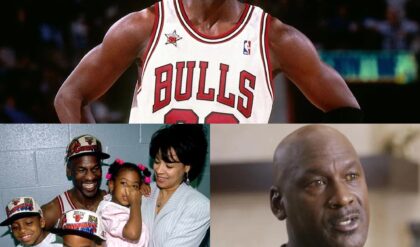The actor sat down with IndieWire to discuss her remarkable roles, what drives her as an actor, and (possible) life after the MCU.

Everett Collection
For the first time in years, Elizabeth Olsen can speak freely.
The actor who spent close to a decade portraying Scarlet Witch in the Marvel Cinematic Universe takes on a different role as Candy Montgomery in David E. Kelley’s “Love and Death” — though maybe not that different. (“Women in distress?” said Olsen, trying to pinpoint her signature character. “Crazy moms?”) Unlike any of her MCU projects, Olsen can discuss this one without fear of spoilers or consequence. Montgomery killed her neighbor with an axe in 1980, and “Love and Death” tells the story of the events leading up to and resulting from that horror.
“Oh my god, it’s so nice to talk about something,” Olsen said, visibly relaxing into a deeply cushioned sofa at the Warner Bros. building in New York in April. “It’s really annoying doing press and not being able to say anything. And then I end up doing retroactive press from Marvel projects, because people want to talk about the thing I couldn’t talk about.”
Olsen has built a career playing singular (if eccentric) women, and it’s as much a deliberate choice as it is her belief that she just isn’t right for other roles.
“I just don’t know how to be an ingenue,” she said. “I’ve never known how. I don’t know how to be comfortable in my skin knowing that’s the purpose I’m serving, but I think most women who are ingenues maybe don’t think of themselves as such.”
In the same way, she found herself wanting distance from women portrayed as traditionally maternal, nurturing, or sweet. It’s a fine sentiment, Olsen said, to think all women have that in them, but it’s infinitely more compelling to explore their multitudes. “Instead of judging, I would rather get behind them and understand them,” she said.
So the question has to be asked of this particular actor, who’s also a known Taylor Swift fan: Is she in her antihero era?
“I feel like I’ll forever be in that,” Olsen said. “I don’t know if I ever want to play the hero.”
 “Love and Death”JAKE GILES NETTER/HBO Max
“Love and Death”JAKE GILES NETTER/HBO Max
“Special is the exact word I would use to describe Lizzie,” “Love and Death” director Lesli Linka Glatter told IndieWire via email. “On top of being an incredible human being, Lizzie has a generosity of spirit and as an actor, has the ability to allow us to travel deep inside of a character to show us something about the human condition.”
The desire for distinction dates back to her childhood — not in acting, but in dance, where Olsen said she consciously didn’t pursue certain parts. “I had a feeling I wasn’t gonna be the Sugar Plum Fairy because I didn’t have certain skills — I knew I had more flavor than I did technique,” she said. “It’s good to know your weaknesses.”
She laughs at that, a boisterous belly laugh rarely used in her characters. There’s something about the way she says flavor that makes it sounds like a euphemism, maybe one used in her past that she’s now reclaimed.
Portraying complicated, even unlikable people doesn’t faze Olsen. What has challenged her, she said, was an element designed to be unnoticed: background actors. Working with them “made me feel exposed, like a liar or something.” Working on Gareth Edwards’ “Godzilla” nipped that fear in the bud.
“With those kinds of budgets, you end up having to be around hundreds of people you don’t know and interact with in this make-believe world,” she said. “It makes you feel a little stupid sometimes. I remember having to be around so many extras and feeling so much pressure and so self-conscious. That was something I had to get over.”
Playing the off-kilter heroine is its own high-wire act. In “WandaVision” and “Doctor Strange in the Multiverse of Madness,” Olsen plays Wanda Maximoff a.k.a. Scarlet Witch in both, but one is the protagonist and one the antagonist. She’s curious to confer with her “WandaVision” costar Kathryn Hahn after the production of “Agatha,” which positions Hahn’s titular witch in the same way.
“I couldn’t play like the high school girlfriend or whatever,” said Olsen. It just doesn’t fit with my personality. It’s not about making the choice, it’s just about what I actually put off in the world and therefore I just don’t get those jobs.”
In person, Olsen conveys consummate professionalism — not closed off, but focused. Her eyes are never without that disarming depth in Sean Durkin’s “Martha Marcy May Marlene,” nor in her turn as Marvel’s Scarlet Witch (especially in “WandaVision”), nor in David E. Kelley’s “Love and Death,” now airing weekly on HBO Max.
Maybe it stems from sitting opposite a journalist on a lush sofa that’s low, deep and never quite permits comfort, but Olsen has an air that suggests immense discipline and dedicating herself wholly to the task at hand — whether that’s an imaginary TV series, finding the humanity in an axe murderer, or giving an interview about her career. She gets that from parents Jarnette and David — a dancer and real estate agent, respectively — in whom she saw fierce commitment to their chosen fields.
“They both had things that were very specific that required a lot of discipline and dedication,” Olsen said. “That’s the only way I can really think about how their experiences affected us. It was very much about if you like something, work really hard at it.”
Following both parents’ examples, Olsen has a real estate license and trained as a dancer for years. She credits dance as “one of the most important things I did my whole life” because it enforced so much (there’s that word again) discipline. “If there’s one thing that made me a better student or that made me better at whatever job I’ve had,” she said, “it’s discipline.”
 “Martha Marcy May Marlene”©Fox Searchlight/Courtesy Everett Collection
“Martha Marcy May Marlene”©Fox Searchlight/Courtesy Everett Collection
Olsen was born Elizabeth Chase Olsen, her middle name chosen so that she would “chase” after older siblings Mary-Kate, Ashley, and Trent. “I wish there was a better origin story for that name,” she deadpanned. As it turned out, the name wasn’t prescient. Her sisters began working as 9-month-old twins on ABC’s “Full House,” but Olsen wasn’t desperate to follow suit. From her point of view, Mary-Kate and Ashley worked, missing out on school and sports and other things young Lizzie adored. When an audition meant that she missed one “Nutcracker” dance recital, acting became a dream quickly tabled for future reference.
Olsen can point to how every choice connects to others, from NYU to the Atlantic Theater Company (there she auditioned to play Kerry Condon’s understudy in Martin McDonagh’s “The Cripple of Inishman”), to signing with an agent, to “Martha Marcy May Marlene,” the Sundance debut that put her on the map. Olsen remembers her peers telling her that very weekend in Park City that her life was going to change.
“I felt like, ‘You guys are all in this actual Sundance snow globe, and the rest of the world is outside of it,’” she said. “Lives don’t change like that.’”
Twelve years later, Olsen’s opinion hasn’t changed. Even after becoming an actual Marvel superhero, she still doesn’t feel that she’s had a project upend her life — and she couldn’t be more thankful for that.
“I’ve never had that moment where it’s like — what do they call it, a glow up? Like ‘Now, there she is!’ I don’t even like the amount of attention that I have now, but to have it all happen at once without anything to compare it to sounds really challenging.”
Even as an Avenger, Olsen’s character was eased into the MCU rather than thrust into notoriety like many of her costars. “It felt scary to say yes to doing a TV show with these characters, and then putting it on an app that didn’t [yet] exist,” she said of Disney+ series “WandaVision.” “It didn’t feel like a safe place.”
When the show premiered, Olsen was actually living outside London (“a small, bucolic town”) — revealed to BBC Radio as Richmond, also known as the setting of “Ted Lasso.” It was worlds away from the marketing blitz behind Marvel’s first Disney+ series.
“With ‘WandaVision,’ I felt like I was in a bubble,” she said. “Until I saw a video of a drag brunch [with Wanda drag], and I was like, ‘Oh my god, we made it.’”
 “WandaVision”Courtesy of Marvel Studios
“WandaVision”Courtesy of Marvel Studios
Olsen has spent an inordinate amount of time addressing whether Scarlet Witch will return to the MCU, a question we choose to skip during our conversation. Both she and Marvel Studios president Kevin Feige have expressed enthusiasm for bringing the character back, but for now Olsen is proud of her trajectory.
“I’m really proud of what we’ve been able to do with the character — and characters, like with Vision (Paul Bettany),” she said. “There was a growth there that I couldn’t have predicted.” And thanks to “WandaVision,” Olsen said she felt “super tuned” going into “Love and Death,” no longer intimidated by the rigorous process of a TV show.
“I like being tired by work,” she said. “There was something so physical about getting to be a part of [“WandaVision”] that was a great learning experience for my body going into ‘Love and Death.’ I felt like I was a little machine — I knew how to move my body through space in a different way.”
Olsen said she was “definitely in everyone’s business” on “Love and Death,” hungry to learn about every aspect of production (with Glatter’s blessing). “I just had so much information all the time, and I loved it,” she recalls. “It’s something I can’t shake now.”
Olsen also starred in and executive produced the 2018 Facebook series “Sorry for Your Loss,” created by Kit Steinkellner. Olsen said the character felt much closer to herself and it fueled her desire to grow — along with that Olsenian instinct to observe, grind, perform, and excel.
And yet… for all of her discipline, Olsen said she doesn’t aspire to be “the best.” She prefers gaining perspective and opportunities to learn. “I don’t like trying to be number one. I think that’s a bad position to be in,” she said. “And it’s not like you can be the best at acting because it’s subjective.”
As a viewer, Olsen loves the work of Yorgos Lanthimos and sings her praise for Ari Aster’s “Beau is Afraid.” She hopes to return to theater at some point, something American actors now seem to be doing with the fluidity of their British counterparts. She has a clearer idea of what to look for in collaborators, especially directors. “I don’t know if it’s something that I know how to put words to, it’s a point of view,” she said. “And it’s about taste… when people have very clear aesthetic choices.”
Olsen admits she hates the performative aspects of press. It means getting up early, hair and makeup, photo shoots — but she loves talking about projects and process, getting in the weeds of her own creativity. The job is her favorite thing. When I ask where she sees herself in five years, the answer encompasses all the work she hopes to do, the indelible characters she’ll play, and implicit success — even if she’s not at the top.
“Probably sitting on a sofa, talking to a journalist,” she said with another laugh.

